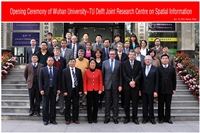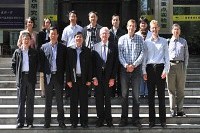-
Introducing Glenn Vancauwenberghe

In July Glenn Vancauwenberghe joined the Knowledge Centre Open Data. Vancauwenberghe and the Knowledge Centre have been awarded the European Union Marie Curie Fellowship of € 165,000 regarding a two-year study into the impact of various governance models for the provision of open geo-data in Europe. The free availability of government-collected geographical data to businesses and individuals is part of the Digital Agenda of the EU and is being implemented by the INSPIRE directive (Infrastructure for Spatial Information in the European Community). However, there is still little understanding of the impact of open data initiatives, limiting further implementation of open data policies.
In the Netherlands and Britain, where open data are already available to a large extent, but based on a variety of approaches, Vancauwenberghe plans to perform several case studies, working closely with the Dutch Ministry of the Interior and the British Open Data Institute (OID) in London. The results should help to increase the social benefits of open data policy of governments in other countries.
Vancauwenberghe is well known to the open data research sector: he has several scientific publications on open data and open data policy to his name. In 2013 he obtained his PhD on the topic 'Coordination within the geographical data infrastructure'.
A future for electronic handling of real estate transactions
Recently, the section Geo-information and Land Policy (Faculty of Architecture, TU Delft) and the University of Leiden joined hands in research into the state of digitalisation of land registers and public records in EU countries. The Centre for Safety and Security of the Strategic Alliance Leiden-Delft-Erasmus, a three university cooperation, has been awarded a grant for this project in 2015.
Digitalisation of land register systems and public records makes a full electronic handling of real estate transactions possible. This 'e-conveyancing' offers promising prospects for the facilitation of a cross-border property market. Besides advantages like cost savings and accelerating the legal transactions of registered property, there are also risks involved such as fraud, which should be minimised.
Currently, the status of e-conveyancing within the EU is being inventoried as well as the issues of cyber security. The second phase will have an in depth character, thus forming a basis for further working out a doctoral research.Sector should take up open data legal protection
The Computers, Privacy and Data Protection (CPDP) conference in Brussels in January 2016, led by Damian Clifford (KU Leuven), hosted a well-attended panel session 'Data protection and open data in the smart city environment' place. PhD Lorenzo dalla Corte (Knowledge Open Data), expert in this field, was the initiator of this panel. Also three other panelists (Rosana Lemut Strle, Fidel Santiago and Paolo Balboni) gave a presentation. The CPDP conference is the largest in the field of data security.
In their presentations, the panelists pointed out the dangers of large-scale smart technologies, that system designs must be sufficiently able to withstand them, and that the sector must actively enforce a sound legal framework. The panelists emphasised in their presentations that there is still no unambiguous solution for keeping in balance the interests of free provision of data on the one hand and the right to privacy and protection of personal data on the other. The discussion resulted in the call to abandon releasing data without but to switch to a system that reduces unwanted identification and data abuse.Privacy rules threaten use of open data
The European Union's open data policy is aimed at encouraging the reuse of government data by companies, organisations and individuals for commercial products and services. Combinations of data with a spatial component may however inadvertently expose personal information. That privacy is not brought into question, is laid down in the EU Data Protection Directive. The latter, however, is often the case with spatial data, resulting in a more serious restriction of open data than previously thought. It can even lead to non-availability of data.
According to the authors two options are conceivable: fewer strict regulations regarding the use of data and shifting the privacy protection responsibility to the data user. Perhaps a middle ground between these two options can be found. Anyway, the concept of "personal data" needs an adjustment, even within the field of spatial data.
(Bastiaan van Loenen, Stefan Kulk & Hendrik Ploeger, Data protection legislation: A very hungry caterpillar: The case of mapping data in the European Union, in Government Information Quarterly, online since April 30th.)Benefits of open company data
More and more governments make their research data freely available as open data on the Internet. This should result in greater transparency of governance and in social and economic benefits for society through reuse for new purposes. Besides governments also some companies offer their data for free, often with the aim of lowering business costs and generate feedback from customers.
This data release was initially thought to result in more downloads, more website visits, more communication between provider and data users and in more inter-user communication.
Energy provider Liander’s data release resulted in lower transaction costs for both customers and the company itself. Also, it seems that the open data is used by customers to monitor their own energy consumption. The first open dataset triggered the demand for aggregated energy consumption data and data on energy production from wind turbines and photovoltaic panels. More communication with and between customers has, however, not resulted in new user groups and help desk calls did not reduce.
(Frederika Welle Donker, Bastiaan van Loenen & Arnold Bregt, Open Data and Beyond, International Journal of Geographical Information 5 (4), 2016.) -
Safeguarding data protection in an open data world in a smart city context (SPOW)
The European Union’s policy on open data aims at generating value through the re-use of public sector information, such as geographical data. Open data policies should be applied in full compliance with the principles relating to the protection of personal data as safeguarded in the European data protection legal framework. Increased computer power, advancing data mining techniques and the proliferation of publicly available big data extend the scope of the European data protection legal framework to much more (geographic) data than currently assumed and acted upon and could in effect obstruct the implementation of open data policies in the EU. Given the importance of open (geographical) data for smart city concepts, the imbalance between open data and data protection regulations may block the further development and implementation of smart cities.
This research will apply the requirements for effective co-design of data protection and open data regulations to the smart city domains of transport, energy and eHealth with a view to boosting innovation and strengthening the economy.
- More information: www.bk.tudelft.nl/spow
-
Global Legal Interoperability Map of the world (GLIM)
Foundation for international integration of geo-data
The Legal and Socio Economic Committee , part of the Global Spatial Data Infrastructure Association, explores opportunities for unrestricted international exchange of geospatial data. As part of that exploration the working group tries to get insight in the policy and legislation as well as economic frameworks in individual countries and groups of countries, which affect the development of a global geo-data infrastructure in any way.
Bastiaan van Loenen and Joep Crompvoets are chairs of this committee which will bring a dialogue on the now divergent policy and legal approach of national governments. As a first step , the Committee has created the Global Legal Interoperability Map of the world (GLIM), which makes clear what different open data licenses for geo- information are used worldwide. Glim aims at promoting the legal interoperability of geographic data by exploring the global utilisation of open licences for geographic data and services. In 2015 the group will work on a list of geoportals and will present a global overview of how geo - information and privacy laws and regulations meet each other.
-
In Memoriam: mr. ing. Bas Kok (17 June 1946 - 23 April 2015)

The death of Bas Kok marks the loss of one of the driving forces of the geo-information sector in the Netherlands and beyond.
Bas started his career at the Netherlands’ Cadastre, Land Registry and Mapping Agency, where his roles included that of project engineer working on land consolidation and redevelopment projects. As Director of the Netherlands Council for Geo-Information (Ravi), he laid the foundations for the way in which geographic information is currently organised in the Netherlands. At the Ravi, Bas organised commitment for the formation of the Structure Plan for Land Information in 1992. Six key registrations were identified that form the heart of what we nowadays call the system of key registrations. With Bas as its Director, the Ravi had enormous influence on the provision of geo-information in the Netherlands in the 1990s. Bas represented the sector in a variety of inter-departmental working groups, including those relating to e-government and authentic registrations; he initiated policy and research into statutory limitations, cable and pipeline registrations, and the registration of soil pollution. The popular specialist journal, VI Matrix, was Bas’ idea; he brought the most prominent international geo-information congress to the Netherlands and was one of the driving forces behind the biggest knowledge innovation programme the sector has ever seen.
Bas not only operated in the Netherlands but realised early on that a good spatial data infrastructure (SDI) does not stop at a country’s borders. He and a number of international colleagues recognised the increasing influence of ‘Europe’ and together they set up the European Umbrella Organisation for Geographic Information (EUROGI) in 1994. It was this group that was the cornerstone for what eventually became the European directive, INSPIRE, recognised everywhere as best practice SDI. In global terms, Bas was closely involved in the setting up of the Global Spatial Data Infrastructure Association (GSDI), of which he was president from 2008 to 2010. The annual GSDI congress was the flagship geographic event for many years, where the primary focus was on exchanging knowledge about the governance of an SDI.
Bas’ need to exchange knowledge with young talent as well was formalised in 1998 when he was given a part-time appointment as an associate professor at Delft University of Technology. For 15 years, he thoroughly enjoying giving lectures with a highly interactive content on spatial data infrastructures, international developments in relation to geo-information and on the assessment of the success of SDIs.
Bas began a new adventure in 2010: the Knowledge Centre Geo-information Governance, in which work is done on knowledge issues relating to the governance of geographic information in conjunction with eight partner organisations. To his sorrow, he was unable to attend the kick-off conference for the Knowledge Centre in 2014. His illness did not however prevent him from working in the background to establish its framework.
Following a successful recovery process, Bas was ready to resume his old life again at the beginning of 2015. To his dismay, however, and that of everyone who loved him, the disease struck once more.
Bas Kok died in the Antoni van Leeuwenhoek hospital in Amsterdam on 23 April. He was 68.
The funural is on Friday 1st May at 13:30, Nieuwe Oosterbegraafplaats, Kruislaan 126, 1097 GA Amsterdam.
-
Wuhan University‐TU Delft Joint Research Centre on Spatial Information
On November 12 representatives of the Wuhan University (China) and the Delft University of Technology signed an agreement with which the 'Wuhan University‐TU Delft Joint Research Centre on Spatial Information' was formally established. The cooperation covers a very broad spectrum of spatial information topics including Geo Information & Governance. This is a relatively new topic within Wuhan University, and to which TU Delft expects to provide significant support.

-
Knowledge Centre strengthens bonds with Wuhan University
In October 2012 Knowledge Centre’s Bas Kok and Bastiaan van Loenen visited the University of Wuhan in China. Wuhan University is one of the top-universities in China in the field of geoinformation. On November 12 Delft University of Technology and Wuhan University will sign a Memorandum of Understanding in which Geoinformation research is an important topic. In preparation of this signing Bas and Bastiaan gave a lecture about GI and they discussed common research topics.
